HVAC Companies Polegate
Best HVAC Services in Polegate
Receive up to 3 Heating and Cooling Services quotes for your project today! Compare profiles, reviews, accreditations, portfolio, etc... and choose the best offer.

DC Heating Solutions
587 reviewsUckfield, GBWelcome to DC Heating Solutions, a family run business offering high quality plumbing, gas and LPG services throughout Uckfield. We pride ourselves on providing a friendly, reliable and trustworthy Plumbing and Heating service, from dripping taps to full central heating installations and everything in-between. Covering LPG and Gas installations. Whether it’s a boiler breakdown, landlord gas safety check, installations, maintenance, service or just some advice. We are fully qualified, gas safe registered and insured, with over 10 years experience in the industry. We are a family run business based in Uckfield and offers high quality plumbing, gas and LPG services to households in Uckfield, Crowborough, Heathfield, Eastbourne, Hailsham, Tunbridge Wells and surrounding villages including East Hoathly, Newick, High Hurstwood, Nutley, Isfield, Mayfield, Cross-In-Hand and Halland.
- Services
- Why Us?
- Accreditations
- Our Team
- Testimonials
- Gallery
Get Quote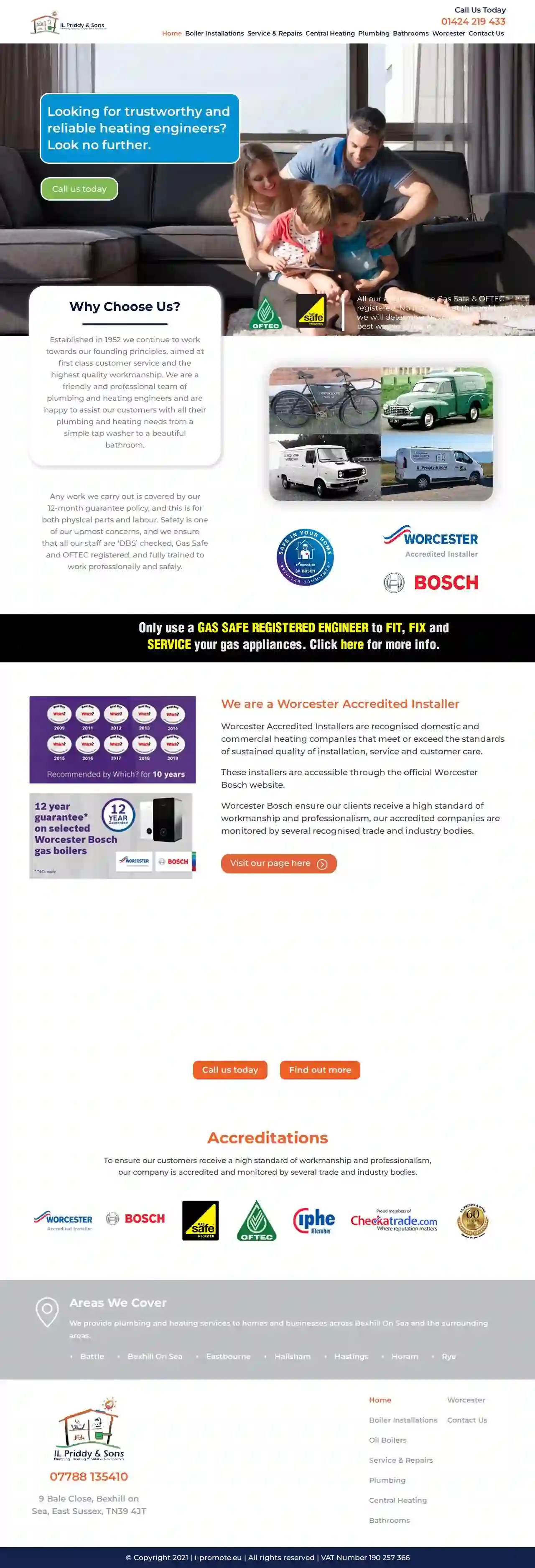
I L Priddy & Sons
3.811 reviews9 Bale Close, Bexhill on Sea, TN39 4JT, GBLooking for trustworthy and reliable heating engineers? Look no further. Call us today. All our engineers are Gas Safe & OFTEC registered. No matter what the problem is, we will determine the cause and find the best way to repair it. Why Choose Us? Established in 1952 we continue to work towards our founding principles, aimed at first class customer service and the highest quality workmanship. We are a friendly and professional team of plumbing and heating engineers and are happy to assist our customers with all their plumbing and heating needs from a simple tap washer to a beautiful bathroom. Any work we carry out is covered by our 12-month guarantee policy, and this is for both physical parts and labour. Safety is one of our upmost concerns, and we ensure that all our staff are ‘DBS’ checked, Gas Safe and OFTEC registered, and fully trained to work professionally and safely. Only use a GAS SAFE REGISTERED ENGINEER to FIT, FIX and SERVICE your gas appliances. Click here for more info. We are a Worcester Accredited Installer Worcester Accredited Installers are recognised domestic and commercial heating companies that meet or exceed the standards of sustained quality of installation, service and customer care.These installers are accessible through the official Worcester Bosch website. Worcester Bosch ensure our clients receive a high standard of workmanship and professionalism, our accredited companies are monitored by several recognised trade and industry bodies. Visit our page here We offer you the highest quality workmanship and services Our Services Include: Bathroom Refurbishments Burst Pipes Central Heating Installations Emergency Plumbers Energy Efficient Advice Gas Boiler Installations Gas Boiler Repairs Gas Boiler Breakdowns Gas Cookers & Hobs Gas Safety Inspections General Plumbing Immersion Tanks Landlord Safety Certificates Powerflushing Replacements and Repairs Replacement Radiators Solar Hot Water Underfloor Heating Call us today Find out more Accreditations To ensure our customers receive a high standard of workmanship and professionalism, our company is accredited and monitored by several trade and industry bodies. Areas We Cover We provide plumbing and heating services to homes and businesses across Bexhill On Sea and the surrounding areas. Battle Bexhill On Sea Eastbourne Hailsham Hastings Horam Rye
- Services
- Why Us?
- Accreditations
- Gallery
Get Quote
Central Heating Care
54 reviewsHastings, GBCHC Central Heating Care Ltd. is a local business dedicated to providing comprehensive gas appliance installations, maintenance, and emergency services across Sussex. Our team of skilled engineers not only specializes in gas work but also offers a wide range range of general plumbing services. We understand the importance of a reliable and efficient heating system, which is why we offer annual servicing to ensure your boiler runs smoothly and safely. In case of emergencies, our team is available 24/7 to diagnose and repair any issues promptly. We also cater to those looking to upgrade their systems with modern, high-temperature Air Source Heat Pumps. At CHC, we prioritize customer satisfaction and strive to deliver exceptional service with a focus on quality and attention to detail.
- Services
- Why Us?
- Accreditations
- Our Team
- Testimonials
- Gallery
Get Quote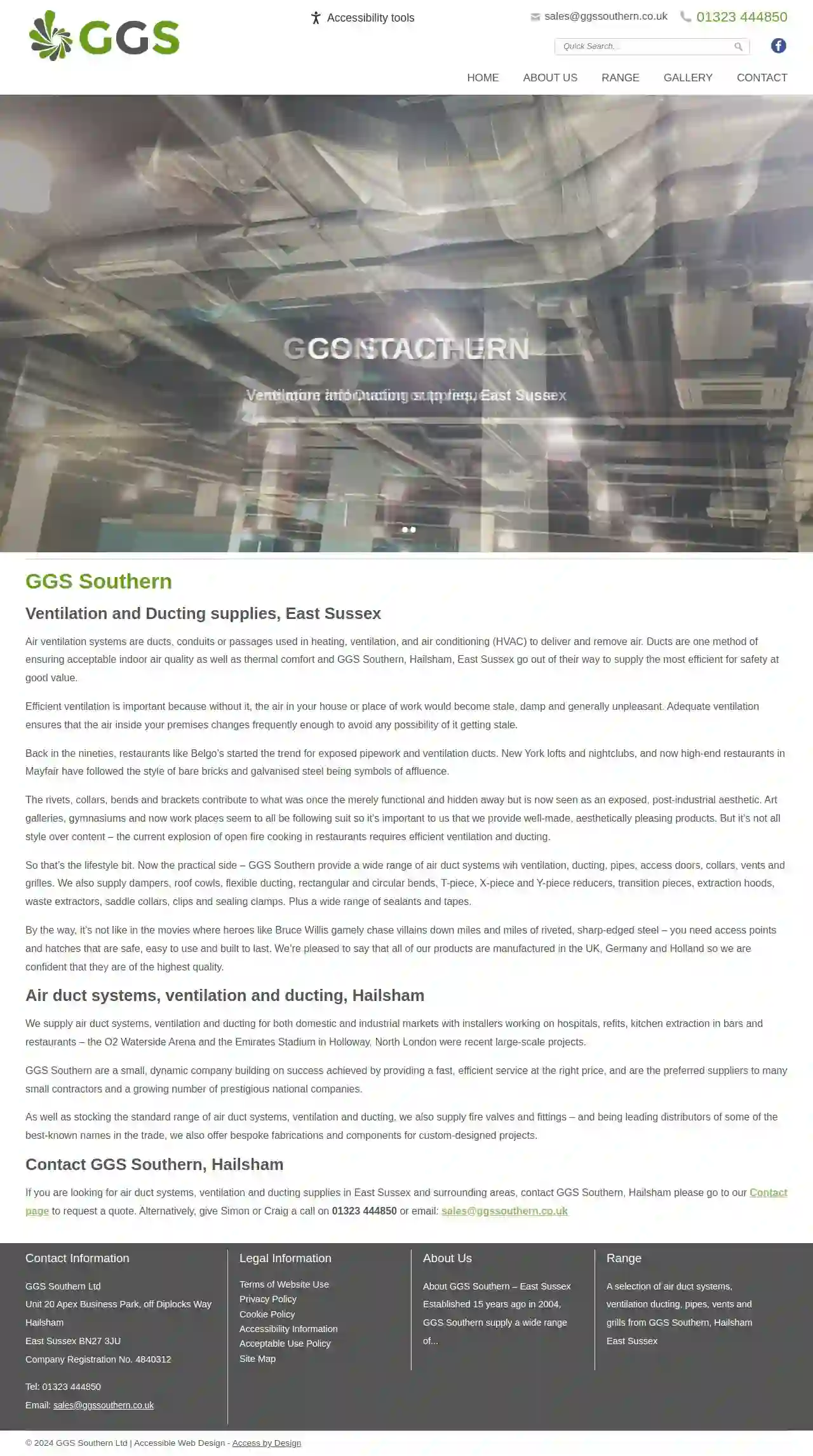
GGS Southern Ltd
4.85 reviewsUnit 20 Apex Business Park, off Diplocks Way, Hailsham, BN27 3JU, GBGGS Southern, based in Hailsham, East Sussex, is a leading supplier of ventilation and ducting systems for both domestic and industrial markets. Established in 2004, the company has built a reputation for providing fast, efficient service and high-quality products at competitive prices. GGS Southern's product range includes a wide variety of air duct systems, ventilation ducting, pipes, vents, grilles, dampers, roof cowls, flexible ducting, bends, reducers, transition pieces, extraction hoods, waste extractors, saddle collars, clips, sealing clamps, sealants, and tapes. They also supply fire valves and fittings and offer bespoke fabrications and components for custom-designed projects. GGS Southern's commitment to quality is reflected in their sourcing of products from reputable manufacturers in the UK, Germany, and Holland. The company has worked on a range of projects, from hospitals and refits to kitchen extraction in bars and restaurants, including large-scale projects like the O2 Waterside Arena and the Emirates Stadium. GGS Southern is the preferred supplier to many small contractors and a growing number of prestigious national companies.
- Services
- Why Us?
- Gallery
Get Quote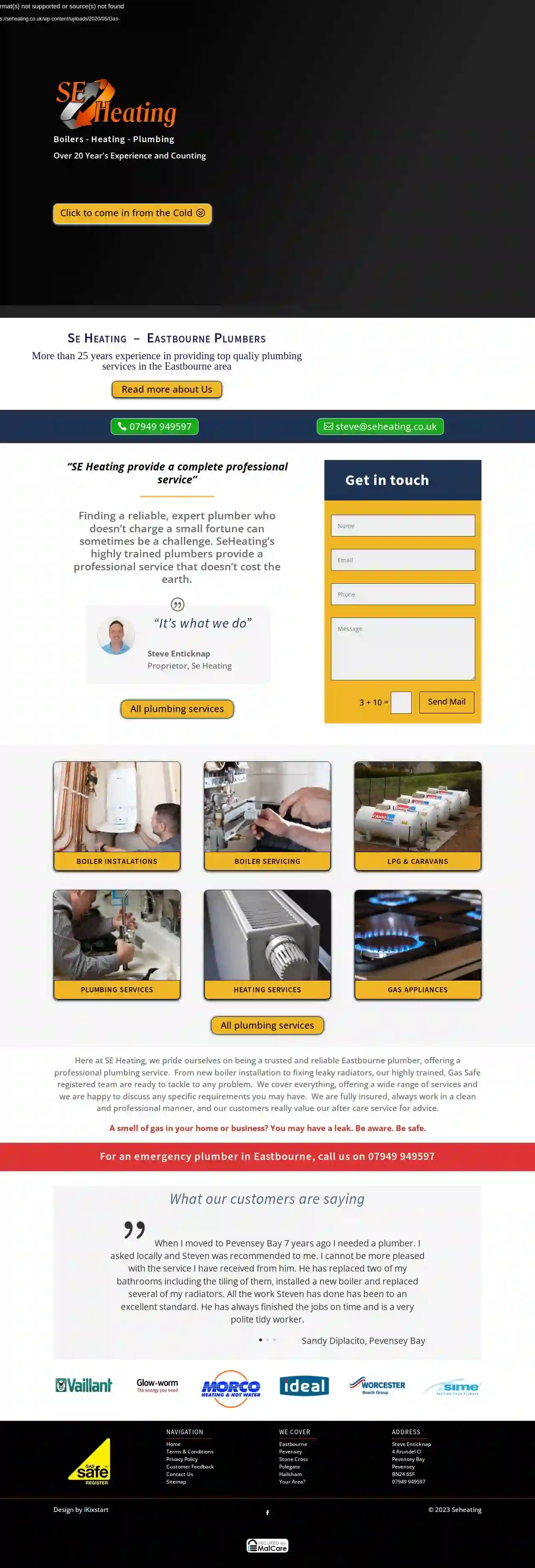
SE Heating
514 reviews4 Arundel Cl, BN24 6SF, GBSe Heating is a trusted and reliable Eastbourne plumber, offering a professional plumbing service with over 25 years of experience. We pride ourselves on being a local contractor who is reliable, trustworthy, and our work is of a high standard and our pricing is fair. We cover everything, offering a wide range of services, including boiler installations, boiler servicing, LPG & Caravans, plumbing services, heating services, and gas appliances. Our team is highly trained, Gas Safe registered, and fully insured. We are committed to providing a one-stop solution from start to finish, removal of old plumbing, and cleaning up after we've finished. With over 25 years in the Eastbourne plumbing industry, certified for both Natural Gas and LPG (Liquid Propane Gas), Se Heating can cater for all your plumbing needs, at your home, office, business, caravan, or boat.
- Services
- Why Us?
- Accreditations
- Our Team
- Testimonials
- Gallery
Get Quote
Hodge Plumbing & Heating Ltd
4.946 reviewsBexhill-On-Sea, East Sussex, 32 Green Lane, TN39 4PH, GBAt Hodge Plumbing & Heating LTD we specialise in central heating boilers and are registered installers for Vaillant and Glow-worm. We have many years experience and offer a range of services that offer peace of mind and top quality workmanship. All carried out on time and very reasonably priced.
- Services
- Why Us?
- Accreditations
- Our Team
- Gallery
Get Quote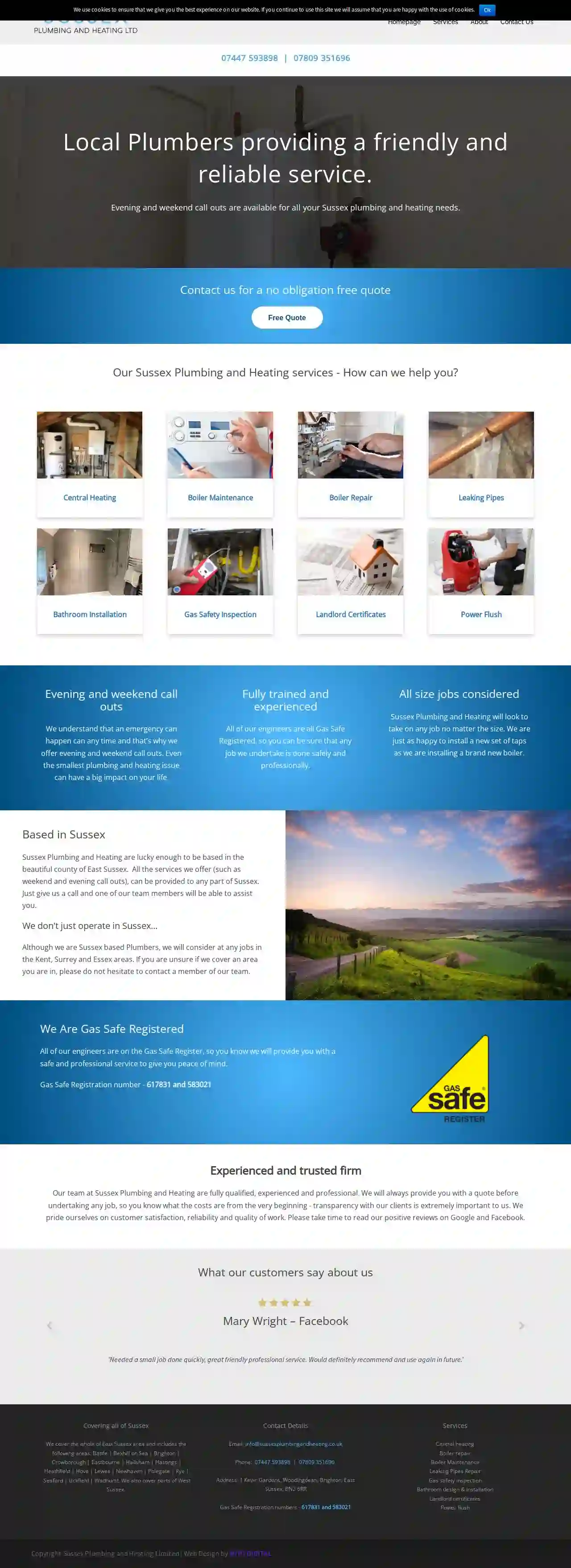
Sussex Plumbing and Heating Limited
Woodingdean, Brighton, East Sussex, 1 Kevin Gardens, BN2 6RR, GBSussex Plumbing and Heating is a local plumbing and heating company based in East Sussex, providing a friendly and reliable service to all parts of Sussex, Kent, Surrey, Essex, and Hampshire. We understand that an emergency can happen at any time, and that's why we offer evening and weekend call outs. Our team of fully trained and experienced engineers are all Gas Safe Registered, ensuring a safe and professional service. We pride ourselves on customer satisfaction, reliability, and quality of work, and aim to provide a transparent estimate before undertaking any job. We cover the whole of East Sussex area, including Battle, Bexhill on Sea, Brighton, Crowborough, Eastbourne, Hailsham, Hastings, Heathfield, Hove, Lewes, Newhaven, Polegate, Rye, Seaford, Uckfield, and Wadhurst, as well as parts of West Sussex.
- Services
- Why Us?
- Accreditations
- Our Team
- Testimonials
- Gallery
Get Quote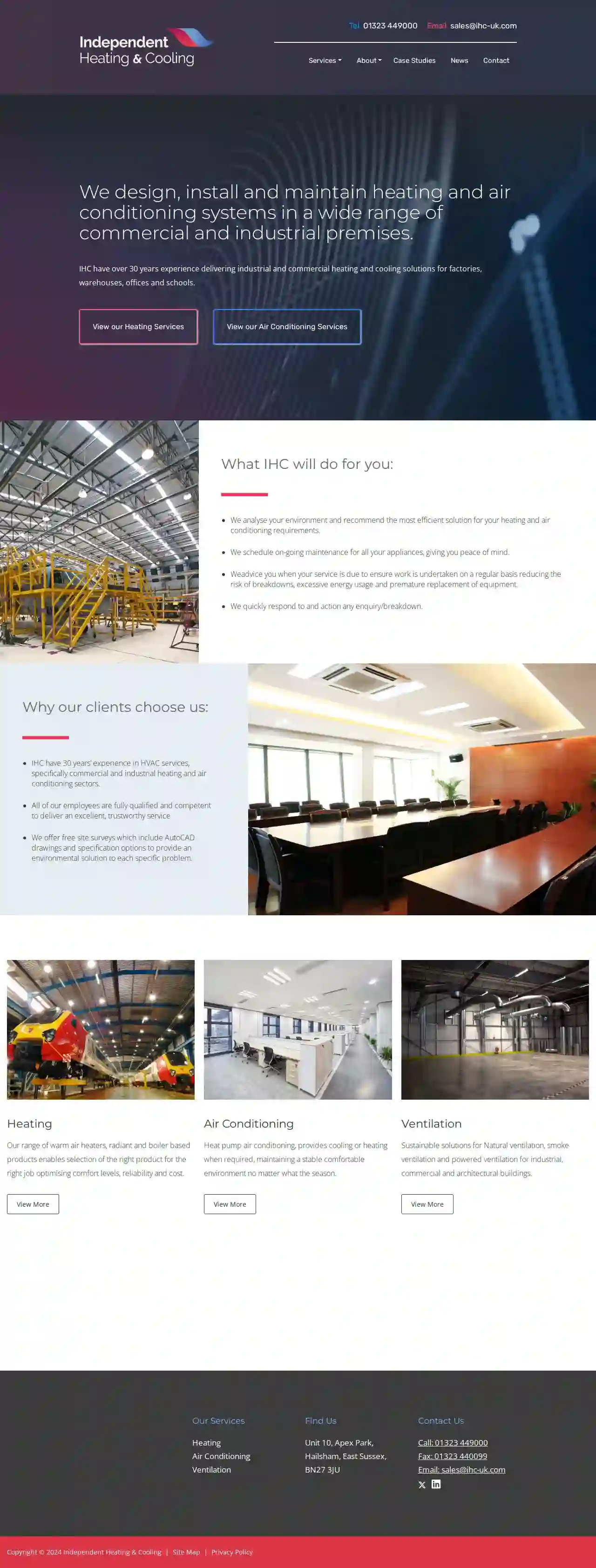
Independent Heating & Cooling
51 reviewsUnit 10, Apex Park, Hailsham, BN27 3JU, GBIndependent Heating & Cooling (IHC) is a company with over 30 years of experience providing heating and air conditioning solutions for commercial and industrial clients. They specialize in designing, installing, and maintaining a wide range of systems, including warm air heaters, radiant heating, boilers, air curtains, heat pump air conditioning, and various ventilation systems. IHC serves a variety of sectors such as factories, warehouses, offices, and schools. IHC prides itself on its team of fully qualified and competent employees who deliver a trustworthy service. They offer free site surveys with AutoCAD drawings and specification options to ensure each client receives a tailored environmental solution.
- Services
- Why Us?
- Gallery
Get Quote
Peak Plumbing and Heating Sussex Ltd
55 reviews30 Denton Road, Newhaven, BN9 0PY, GBPeak Plumbing and Heating Sussex is a team of expert plumbers and bathroom fitters dedicated to transforming your bathroom ideas into reality. We are fully qualified and experienced, members of the Gas Safe Register, and Checkatrade accredited, ensuring quality and reliability. We understand that plumbing problems can be stressful, so we offer a quick and efficient 24/7 service. We pride ourselves on providing high-quality materials and workmanship, using the latest tools for a wide range of plumbing and heating systems. We are upfront about our pricing, providing accurate quotes before work begins and itemised invoices upon completion. Your satisfaction is our priority, and we guarantee 100% satisfaction with our services. We serve communities across Sussex, including Brighton, Hove, Worthing, Eastbourne, Crawley, Hastings, Seaford, Newhaven, and Lewes. If you're unsure if we cover your area, please don't hesitate to call us. We are fully insured, Gas-safe registered, and a member of Checkatrade, giving you peace of mind. At Peak Plumbing and Heating Sussex, we are committed to providing the highest quality plumbing and heating services. Your home is your sanctuary, and we take pride in ensuring your plumbing and heating systems are working properly. Our client promise: Prompt & reliable services: We respond quickly to all enquiries and send an engineer to your home or business as soon as possible. High-quality materials & workmanship: Our team of professionally trained, gas-safe engineers are equipped with the latest tools to work on a wide range of plumbing and heating systems. Upfront & honest pricing: We provide you with an accurate quote before starting any work and a fully itemised invoice upon completion. 100% satisfaction guarantee: We want you to be completely satisfied with your experience, and we will do whatever it takes to ensure that you are.
- Services
- Why Us?
- Accreditations
- Gallery
Get Quote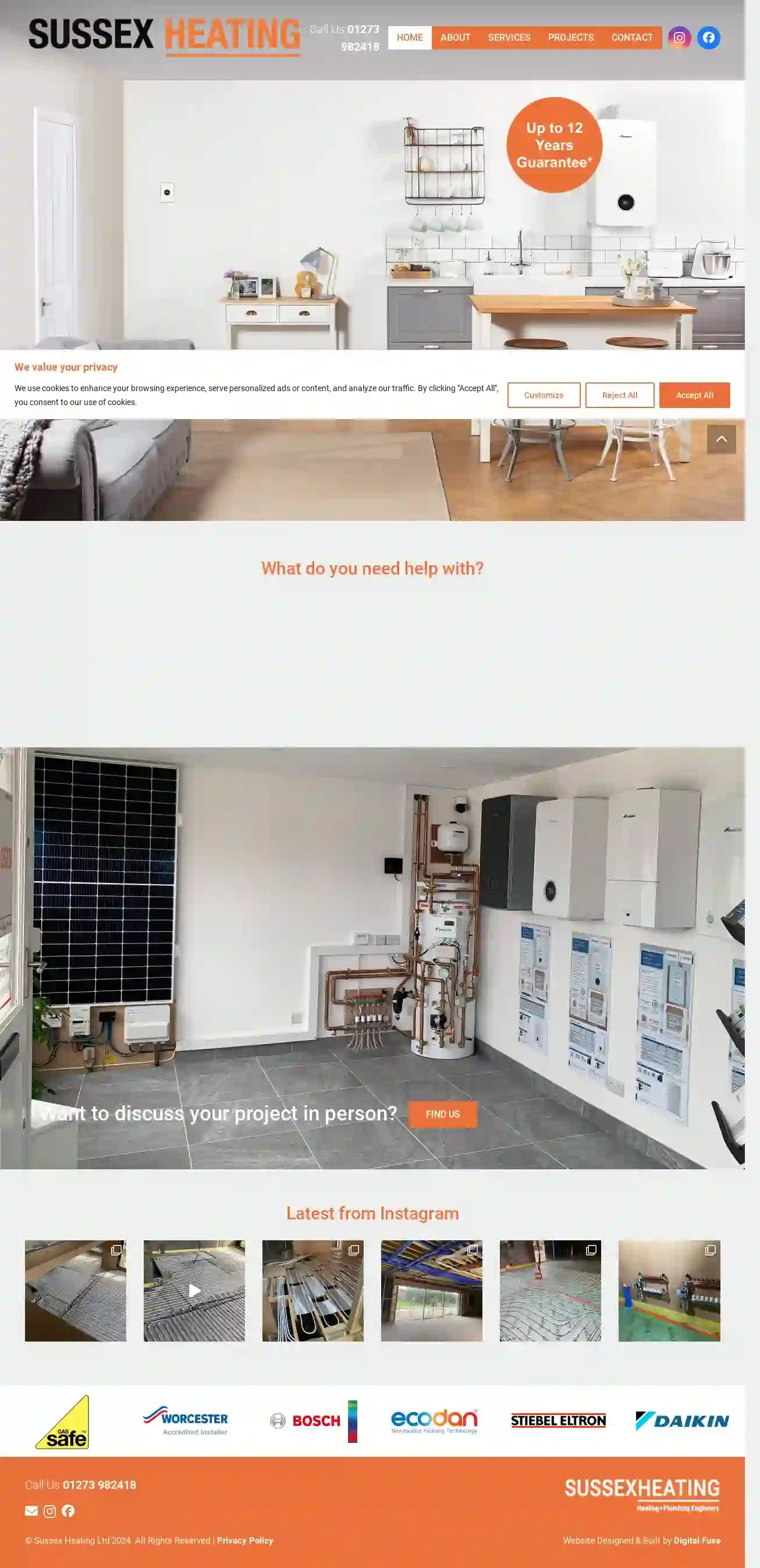
SUSSEX HEATING LTD
510 reviewsHastings, GBSussex Heating Ltd is a local heating company based in Sussex, UK. We specialise in providing high-quality heating solutions for both domestic and commercial properties. Our team of experienced engineers is dedicated to delivering exceptional customer service and ensuring your complete satisfaction. We offer a wide range of services, including the installation, repair, and maintenance of boilers, hot water cylinders, heat pumps, underfloor heating, and solar panels. Whether you're looking for a new heating system or need repairs to your existing one, Sussex Heating Ltd is here to help.
- Services
- Why Us?
- Gallery
Get Quote
Over 12,692+ HVAC Companies on our directory
Our HVAC contractors operate in Polegate & beyond!
HVACCompaniesHub has curated and vetted Top HVAC Businesses arround Polegate. Find a top & trustworthy pro today.
Frequently Asked Questions About HVAC Companies
- Frequent Repairs: If your system requires repairs frequently, it may be more cost-effective to replace it.
- Age of System: HVAC systems typically last 15-20 years. If your system is nearing or beyond that age, it's likely less efficient and more prone to breakdowns.
- Increased Energy Bills: A significant rise in energy bills could indicate your system is losing efficiency and needs replacement.
- Uneven Temperatures: If some rooms are too hot or too cold, it could be a sign of ductwork problems or an undersized/aging system.
- Poor Indoor Air Quality: If you're experiencing allergies, dust, or other indoor air quality issues, a new HVAC system with better filtration could help.
- Strange Noises or Smells: Unusual noises or foul odors emanating from your HVAC system could signal the need for a new HVAC system.
- AC not cooling: Refrigerant leaks, compressor issues, or thermostat problems.
- Furnace not heating: Pilot light or ignition control issues, blower motor problems, or clogged filters.
- Uneven temperatures: Ductwork leaks, inadequate insulation, or faulty thermostats.
- Poor air quality: Dirty air filters, mold growth in ductwork, or inadequate ventilation.
- Strange noises: Unusual sounds from the system can indicate a variety of problems with different components.
- High energy bills: Inefficient systems, ductwork leaks, or improper thermostat settings.
- Regular Maintenance: Schedule annual HVAC maintenance to ensure your system is running at peak efficiency.
- Programmable Thermostat: Use a programmable or smart thermostat to optimize temperature settings based on your schedule.
- Seal Air Leaks: Caulk and weatherstrip windows and doors to prevent drafts.
- Proper Insulation: Ensure adequate insulation in your attic, walls, and floors to prevent heat loss in winter and heat gain in summer.
- Ventilation: Use fans strategically to circulate air and reduce reliance on AC.
- Energy-Efficient Appliances: Choose energy-efficient appliances to reduce your overall energy load.
- HVAC Zoning: Consider zoning your HVAC system to condition different areas of your home separately.
What are the benefits of a programmable thermostat?
What are the signs that I need a new HVAC system?
What are the most common HVAC problems?
Common HVAC problems include:
How can I reduce my HVAC energy consumption?
What are the benefits of a programmable thermostat?
What are the signs that I need a new HVAC system?
- Frequent Repairs: If your system requires repairs often, it may be more cost-effective to replace it.
- Age of System: HVAC systems typically last 15-20 years. If your system is nearing or beyond that age, it's likely less efficient and more prone to breakdowns.
- Increased Energy Bills: A significant rise in energy bills could indicate your system is losing efficiency and needs replacement.
- Uneven Temperatures: If some rooms are too hot or too cold, it could be a sign of ductwork problems or an undersized/aging system.
- Poor Indoor Air Quality: If you're experiencing allergies, dust, or other indoor air quality issues, a new HVAC system with better filtration could help.
- Strange Noises or Smells: Unusual noises or foul odors emanating from your HVAC system could signal the need for a new HVAC system.
What are the most common HVAC problems?
Common HVAC problems include:
- AC not cooling: Refrigerant leaks, compressor issues, or thermostat problems.
- Furnace not heating: Pilot light or ignition control issues, blower motor problems, or clogged filters.
- Uneven temperatures: Ductwork leaks, inadequate insulation, or faulty thermostats.
- Poor air quality: Dirty air filters, mold growth in ductwork, or inadequate ventilation.
- Strange noises: Unusual sounds from the system can indicate a variety of problems with different components.
- High energy bills: Inefficient systems, ductwork leaks, or improper thermostat settings.
How can I reduce my HVAC energy consumption?
- Regular Maintenance: Schedule annual HVAC maintenance to ensure your system is running at peak efficiency.
- Programmable Thermostat: Use a programmable or smart thermostat to optimize temperature settings based on your schedule.
- Seal Air Leaks: Caulk and weatherstrip windows and doors to prevent drafts.
- Proper Insulation: Ensure adequate insulation in your attic, walls, and floors to prevent heat loss in winter and heat gain in summer.
- Ventilation: Use fans strategically to circulate air and reduce reliance on AC.
- Energy-Efficient Appliances: Choose energy-efficient appliances to reduce your overall energy load.
- HVAC Zoning: Consider zoning your HVAC system to condition different areas of your home separately.